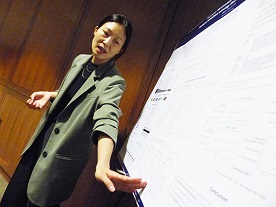
On May 30-31, the Institution for Social and Policy Studies’ Center for the Study of American Politics (CSAP) held a conference exploring what the latest political science research can tell us about public issue preferences.
For example: How can we determine what people want from their government? Are voters up to the task of making meaningful decisions in democratic elections? For those things they care about, do they have sufficiently well-developed preferences for choosing candidates who best represent what they want? Are existing data sufficient to answer these questions? And if not, what can be done?
“What I really like about this conference is gathering a bunch of people who are doing basic research on a common theme but approaching it from a whole variety of perspectives,” said Gregory Huber, director of CSAP, chair of the Political Science Department, and Forst Family Professor of Political Science. “We’ve got researchers who study voter behavior using the tools of formal theory, others who use large scale analysis of survey data, and still others who focus on experimentation — so, a common topic but using a whole range of tools. And when you look around the room, there are new graduate students mixed with faculty members who earned their Ph.D.s in the 90s. It is just an incredibly interesting, accomplished, and diverse group of scholars from all over.”
Read the full story by Rick Harrison at the external link below.
